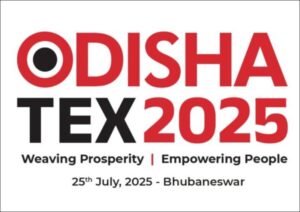Odisha to Host ODISHA TEX 2025 – Eastern India’s Largest Textile Investment Summit
Bhubaneswar, July 25, 2025 – The Odisha government is set to inaugurate the first-ever edition of ODISHA TEX 2025, billed as the largest textile investment summit in Eastern India. Held at the State Convention Centre in Bhubaneswar, the event will be inaugurated by Chief Minister Mohan Charan Majhi and is widely expected to shape the region’s industrial future.

Strategic Vision and Objective
Designed to position Odisha as a premier national hub for textiles, apparel, technical textiles, footwear, luggage, and accessories manufacturing, ODISHA TEX 2025 aims to attract investors, manufacturers, startups, global brands, and young professionals in one platform. The event reflects Odisha’s ambition to emerge as the “Textile Capital of India” by 2030.
Participation and Industry Engagement
The summit is expected to draw more than 300 delegates from India’s major textile hubs, including Tirupur, Bengaluru, Surat, NCR, Punjab, and West Bengal. It will be organized in collaboration with FICCI and supported by industry associations across textiles, technical textiles, and apparel sectors.
Infrastructure and Policy Support
To support industrial expansion, Odisha is developing six new parks dedicated to textiles, apparel, and wearables. These parks are designed with modern infrastructure to facilitate large-scale apparel and technical textile manufacturing.
Additionally, the state government unveiled revised Odisha Apparel and Technical Textiles Policy (OATTP‑2022) along with operational guidelines to enhance the investment climate, encourage sustainability, and boost global competitiveness.
Investment Momentum: From Prior Conclaves
At the earlier Utkarsh Odisha – Make in Odisha Conclave 2025 held in January, the state secured textile and apparel investment intents worth ₹7,762 crore across eight MoUs involving 36 firms. These commitments are expected to generate approximately 88,000 direct and indirect jobs.
Commitments at that conclave included investments by Shri Maa Textiles, Maa Banadurga Textiles, Pratima Agro Spinning Mills, Tilottama Proprietors, Anubhav Knitwear, Cedra Filtration, among others; two MoUs addressed GI-tag promotion and sericulture conservation via collaboration of the State department with Textile Committee, SIDBI, and the Central Silk Board.
Social and Economic Impact
Officials emphasized the importance of textiles and handlooms for women’s empowerment, rural transformation, and youth employment. Odisha’s rich handloom heritage and skilled artisan base make it well‑suited to scale growth in both traditional and technical textile segments.
The summit serves as a springboard for investment proposals in sustainable textile and silk production, and improved market linkages that can significantly uplift incomes for weavers and artisans.
Key Initiatives and Expected Outcomes
- Major MoUs and Investment Commitments: ODISHA TEX 2025 is expected to culminate in significant announcements and agreements which will substantially enhance Odisha’s industrial development journey.
- Policy Enablement: Operationalizing the OATTP-2022 to attract investment into apparel and technical textile segments, with fiscal incentives and regulatory support for projects up to several crores in investment.
- Creation of Textile Parks: Six strategically located parks with utilities and industrial support will enable efficient textile/garment production and reduce logistical friction for investors.
- Market Access and Partnerships: Engagements with global and domestic textile sector leaders—across fibre, apparel, and technical textiles—via FICCI and other industry platforms.
Expert and Government Statements
Hemant Sharma, IAS and Additional Chief Secretary in Industries, noted Odisha’s progressive policies, robust infrastructure, and skilled workforce as essential drivers in creating a powerful textile ecosystem that aligns with goals like rural uplift and industrial growth under the state’s double-engine regime.
Handlooms, Textiles & Handicrafts Minister Pradeep Bal Samant stressed that these investments will enhance earnings in sectors like silk, handloom, apparel, and technical textiles while preserving the state’s cultural heritage and weaving traditions.